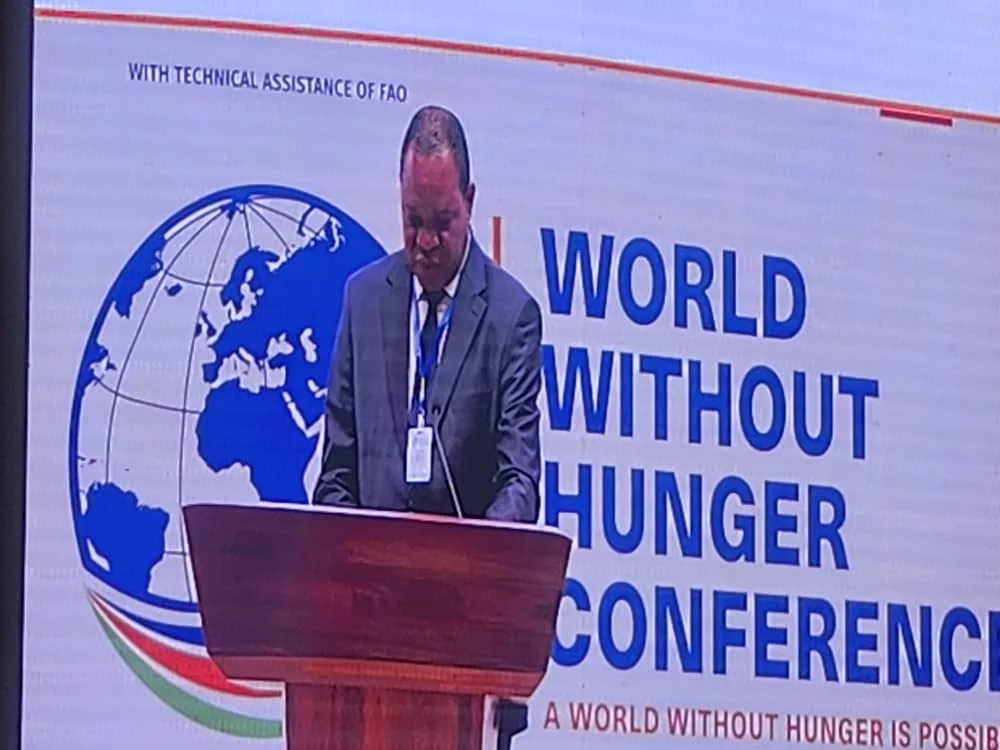|
Getting your Trinity Audio player ready...
|
A high-level political forum on global action against hunger is underway in Addis Ababa, Ethiopia with stakeholders seeking to achieve this goal, importantly in Africa where a large proportion of the population is food insecure annually and increasingly goes hungry.
These were the sentiments for His Excellency, the President of the Republic of Zimbabwe, Dr Emmerson Mnangagwa at the High-level Political Forum on Global Action Against Hunger today in Addis Ababa, delivered by the Minister of Lands, Agriculture, Fisheries, Water and Rural Development, Dr anxious Jongwe Masuka.
The High-Level “World Without Hunger Conference” was organized by the Government of Ethiopia, the United Nations Industrial Development Organisation (UNIDO), and the Africa Union Commission (AUC), with the technical assistance of the Food and Agriculture Organisation (FAO).
“May I applaud the Government of Ethiopia, UNIDO, AUC, and FAO for this timely, contextual, and relevant Conference, which seeks to highlight our collective determination to end hunger, across the globe, but more importantly in Africa where a large proportion of our population is food insecure, where many millions annually and increasingly go hungry, and where our aim to eliminate hunger by 2025 may not be realized,” the President said.
He underscored the fact that against a backdrop of the quadrivariate challenges of climate change, conflicts, macroeconomic turmoil, and pandemics, Africa must craft bold and robust policies and implement radical and transformative strategies to end hunger and improve livelihoods of the predominantly rural populations, with a sharper focus and more urgent attention on women, youths and the marginalized.
President Mnangagwa said that it is in this regard that the government has crafted the Agriculture, Food Systems and Rural Transformation Strategy to achieve both food and nutrition security and to attain food sovereignty; improve livelihoods; and accelerate economic development, as Zimbabwe’s economy is agro-based.
“This is in line with our Vision of becoming a prosperous and empowered upper middle-income society by 2030. To achieve household food security for the 62% of the population residing in rural areas, my government has further launched “Rural Development 8.0”, a cocktail of outcome-based and impact-oriented interventions designed to leave no one and no place behind. Consequently, Zimbabwe has ordinarily become food self-sufficient in normal rainfall years through the wholesale adoption of the sustainable intensive conservation household agriculture model, locally called Pfumvudza/Intwasa.
“Distinguished Guests, Ladies and Gentlemen, Zimbabwe, like many other countries in the Southern Africa region, is grappling with the worst drought in 43 years. In Zimbabwe, cereal production plummeted by 72% during the 2023/2024 summer season, but because of our climate-proofing interventions through increased irrigation development, my government will be able to feed every vulnerable rural household until March 2025, when the next harvest is expected. Meanwhile, vulnerable urban households are receiving cash transfers for the purchase of food. Additionally, all learners at the basic education level will receive food for a meal, every day, during school days until the end of the first term in 2025, in April,” he said.
Furthermore, to build the resilience of communities, the government has mobilized sufficient inputs (fertilizer, seed, and chemicals) for all rural households ahead of the main rainfall season which has just begun, this November. This will enable communities to bounce back and build forward better.
The government, through a transformed extension paradigm, is capacitating communities to view agriculture as a business at every scale, from household to large-scale agriculture.
In this context, in all rural areas in Zimbabwe, resilience-building of households and communities has now shifted to the accelerated establishment of Village Business Units across all the 35 000 rural villages – these are viable, profitable, and sustainable agriculture enterprises whose positive impact will spawn rural aggregation, value addition, and beneficiation and spur rural industrialization.
As part of the broader national agricultural transformation, the government has put in place an enabling policy and regulatory environment; increasing public sector financing of agriculture while crowding in the private sector; emphasising and investing in resilient climate-proofed agriculture and better agro-ecology, soil health and soil fertility management; accelerating investments in technology and modernisation; illuminated the importance of science-led and fact-based management to increase production and productivity; invested in capacity building of farmers and value chain actors; highlighted the criticality of research and innovation; promoted replicable and scalable agricultural entrepreneurship; promoted derisking and insurance for agriculture; invested in infrastructure and logistics; facilitated the provision of markets; highlighted and invested in food systems and nutrition; invested in food loss and waste reduction; and enhanced public-private sector linkages for joint planning and implementation.
These interventions have begun to bear fruit – for example, as evidenced by Zimbabwe’s record wheat production this winter, estimated at one and half times the annual national requirement.
“In conclusion, may I highlight that we must harness our positive, collective, and continent-wide political will to cause the desired change that should, of necessity, under-girdle sustained agricultural transformation. This will end the scourge of hunger on the African continent, concomitantly improve nutrition, and uplift communities out of poverty. I am convinced that this is indeed possible,” he added.






